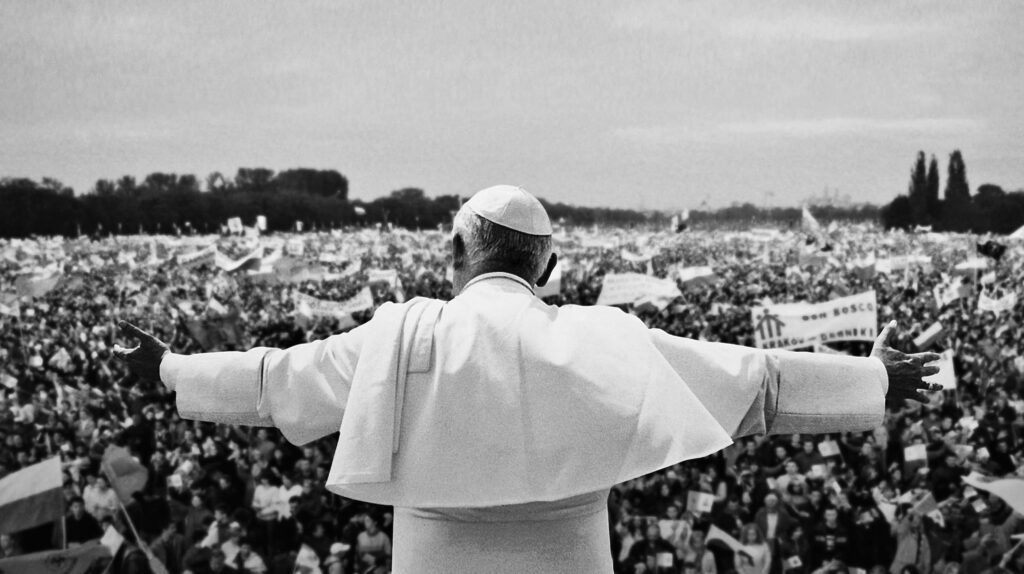Krakow, Poland – As I write this, the participants of the Tertio Millennio Seminar on the Free Society are finishing a lecture on bioethics. They have come from nine different countries to study the Church’s social doctrine for three weeks here in Poland. Later today, they will visit a place Pope John Paul II called the “Golgotha of the modern world.”
More than 1,000,000 men, women, and children, mostly Jews, were murdered at the Nazi death camp of Auschwitz Birkenau. There, St. Maximilian Kolbe volunteered to take the place of a condemned man, giving his own life for a fellow prisoner. It was there that the Jewish philosopher-turned-Carmelite-nun, Sister Teresa Benedicta of the Cross (Edith Stein), was gassed and cremated in August 1942.
The unfathomable slaughter at Auschwitz finally ended when the Red Army arrived in early 1945. The Nazi ideology of terror was vanquished only to have the 20th century’s other great totalitarian ideology take its place.
World War II is sometimes remembered here as the war Poland lost twice – first, in September 1939, when the country was overrun from the west by the advancing forces of the Third Reich and then from the east by the Soviet Army; and again in the aftermath of the War when Poland, like so much of central and eastern Europe, was abandoned by the Western Allies to remain under communist rule for more than four decades.
It’s been my privilege to spend several weeks teaching here in Poland each summer. Over the past 18 years, the students have changed, as have many of the most pressing issues and concerns of the day. When the seminar was founded in 1992 (long before my time) the primary goal was to form future leaders of the “new democracies” just then emerging from almost a half-century of communist rule, so that the work of building post-communist future might be informed by the wisdom of Church’s social doctrine and her understanding of the human person, solidarity, subsidiarity, and the common good.
Freedom, untethered from the truth about man, invariably becomes self-destructive. Neither the most elegantly designed democratic constitutions nor the most efficient and productive economies can alter this basic human fact.
As Pope John Paul II wrote in Centesimus annus: “Where society is so organized as to reduce arbitrarily or even suppress the sphere in which freedom is legitimately exercised, the result is that the life of society becomes progressively disorganized and goes into decline.”
The Polish Pope offered a similar warning to those who came to see license as a remedy to communist oppression. “[F]reedom which refused to be bound to the truth would fall into arbitrariness and end up submitting itself to the vilest of passions, to the point of self-destruction.” When a nation, by force or by choice, lives according to a lie for long enough, the consequences are more than the sum of economic malaise and political dysfunction. Habits change. Cultures change.

After almost a half-century of communism, the kinds of habits – the virtues – on which self-governance depends had atrophied. Citizens had to learn (or re-learn) what had once been simple truths, for example, that trust and truthfulness were not political liabilities but necessary social virtues. This takes time. It can take generations.
The same holds true in the West, where habits of license and excess have become common, virtually the norm. Consumerism, individualism, relativism: these dissolve the very structures of solidarity that ought to give society vitality and strength. The result is seen in the profound forms of social alienation that bear an uncanny resemblance to the alienation produced by communism. Our relative affluence and technological power only exacerbate things by making us complacent.
Much of the West has become inoculated against the Gospel. It’s as though our societies are not just indifferent, but immune to the Good News. The cultural “antibodies” of the Post-Christian West make the Church’s mission of evangelization all the more daunting.
All of this provokes several questions: Can our efforts to humanize and build up a more just society outpace the tendency of our politics, economy, and technology to dehumanize and corrupt? Can we build a healthy culture from within faster than it is eroded from without?
These questions become even more disturbing when one considers that the institutions that have long stood as impediments to the worst forms of cultural corruption – the family and the Church – are in many places in crisis. We face today’s challenges, as it were, with both hands tied behind our backs. Hope can be hard to come by.
My colleague George Weigel has written against what he calls the “tyranny of the possible,” the idea that no matter how dark the times we find ourselves in, no matter how ominous the future may seem, that thing cannot possibly be other than they are. The history of Poland teaches lessons about this, too.
It was only one generation ago that the seeming unbreakable stranglehold of communism over this part of the world came to an abrupt and unexpected end in the events of 1989 and following. And the martyrs of Auschwitz are today venerated as reminders of hope and goodness even in the midst of unspeakable evil. The history of this place is full of reminders that salvation comes, not in the empty promises of ideologies, not from the powerful of the world, but from the One who subjected Himself to death and who calls us each to follow Him up Calvary.
Next week, our seminar will visit a place very different from Auschwitz: the Sanctuary of Divine Mercy, where the mortal remains of St. Faustina Kowalska rest beneath an image that has emerged from obscurity to be venerated the world over. God’s mercy places a limit on evil in the world. His light shines in the darkness – a light the darkness cannot comprehend. He has conquered even death.
Si deus nobiscum quis contranos?
__________















